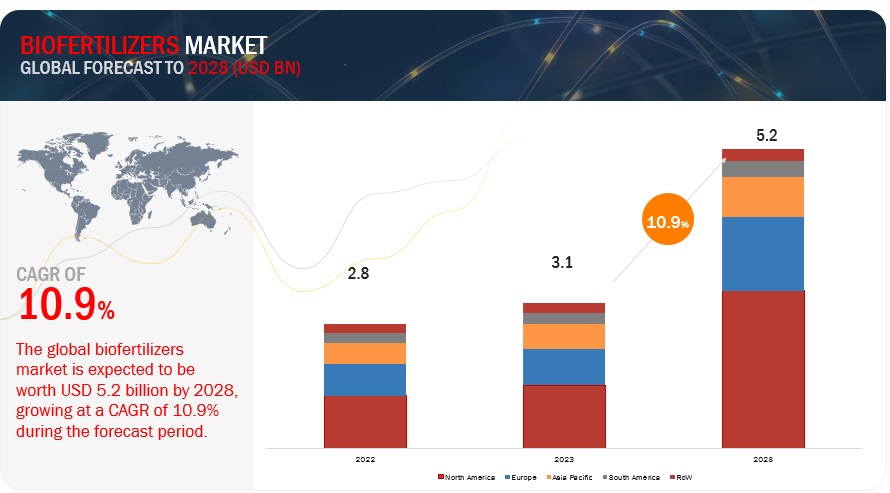The global biofertilizers market was valued 2.8 billion in 2022 and is projected to reach USD 5.2 billion by 2028, growing at a CAGR of 10.9% during the study period. The market Size is estimated to be valued at USD 3.1 billion in 2023. Through natural processes such as nitrogen fixation; phosphate solubilization; and the production of compounds that stimulate growth, biofertilizers provide nutrients to plants. They boost soil organic matter and aid in restoring the soil's natural nutrition cycle. By using biofertilizers, growers can increase the sustainability and health of the soil and cultivate healthy crops. Only bacteria and other biological elements that are not damaging to the environment are present in biofertilizers. As a result, they contribute to reducing pollution brought on by agricultural activities, particularly soil pollution.

Biofertilizers Market Drivers: Adoption of precision farming and protected agriculture
Precision farming aims to maximize agricultural productivity by leveraging cutting-edge technologies to analyze spatial and temporal variability. To enhance crop output and yield, agricultural biologicals are utilized in both precision farming and protected agriculture. The growing adoption of agricultural biologicals in protected agriculture is driving the biofertilizer market. This trend encourages the use of biofertilizers, as farmers can monitor liquid biofertilizer application using GPS-guided geographic information system (GIS) software. Consequently, the increasing land dedicated to precision and protected agriculture is expected to propel the biofertilizer market.
Biofertilizers Market Opportunities: New target markets: Asia Pacific and Africa
The Asia-Pacific and Africa regions are among the largest consumers of fertilizers. Population growth, particularly in Asia, has driven an increase in food demand, consequently boosting fertilizer usage. Governments in these regions are strongly promoting the use of environmentally friendly fertilizers, such as biofertilizers and organic manure, to reduce the adverse effects of chemical fertilizers. Various government agencies have helped raise farmers' awareness of the benefits of biofertilizers. In Africa, extensive conventional farming over the past few decades has relied on synthetic fertilizers to provide essential plant nutrients. However, the excessive use of these fertilizers has degraded soil quality and depleted vital nutrients. This situation has created a pressing need for biofertilizers in the region.
By mode of application, soil treatment segment is anticipated to occupy major share in the biofertilizers market during the study period.
When planting legume seeds in hot, dry, and highly acidic soils, during adverse weather conditions, or when the seeds have been treated with chemicals harmful to rhizobia bacteria, it is crucial to apply a liquid biofertilizer formulation directly to the soil to ensure optimal nodulation. When fertilizers are applied to the soil, they diffuse into the crops, enhancing yield and productivity as the roots are in close contact with the nutrients. This application method promotes growth and boosts the performance of this segment during the review period.
North America is projected to gain the largest market share in the global biofertilizers market.
North America is expected to secure the largest share of the global biofertilizers market. The region's substantial number of suppliers provides farmers with a diverse array of products at competitive prices. Additionally, regional governments are advocating for agricultural practices that minimize environmental impact, thereby promoting the use of biofertilizers. In countries like the US and Canada, the emphasis on large-scale cash crop production further drives market growth.
Top Companies in the Biofertilizers Market
Key players in this market include Novozymes (Denmark), UPL (India), Chr. Hansen Holding A/S (Denmark), Syngenta (Switzerland), T.Stanes and Company Limited (India), Lallemand Inc (Canada), Rizobacter Argentina S.A. (Argentina), Vegalab SA (Switzerland), IPL Biologicals Limited (India), and Kiwa Bio-tech Product Group Cooperation (China).

